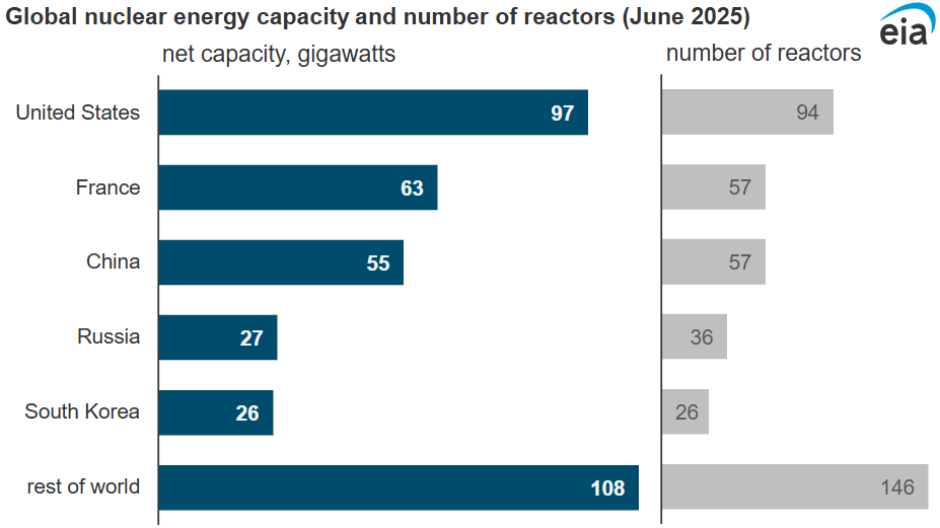Five countries — the United States, France, China, Russia, and South Korea — account for more than two-thirds of the world’s total nuclear electricity generation capacity, according to International Atomic Energy Agency (IAEA) data as of June 2025. Globally, 416 nuclear power reactors operate in 31 countries with a combined net generating capacity of 376 gigawatts (GW).
The U.S., which pioneered commercial nuclear power in the late 1950s with the Shippingport Atomic Power Station in Pennsylvania, remains the world leader. American utilities operate 94 reactors, generating 782 gigawatt-hours (GWh) in 2024 — 19 percent of the country’s electricity supply and 30 percent of global nuclear output in 2023. U.S. reactors also operate at one of the highest global efficiency levels, with a capacity factor of 92 percent in 2024.
France, the second-largest nuclear producer, operates 57 reactors with a total capacity of 63 GW. Nuclear energy supplied nearly 65 percent of the country’s electricity in 2023, a legacy of its rapid reactor build-out between 1975 and 1990 in response to the 1970s oil crisis.
China has the fastest-growing nuclear program, with 57 reactors commissioned since 1991 and 28 more under construction totaling 30 GW. Its 2023 nuclear output exceeded 433 GWh, or 5 percent of national electricity generation. China has adopted and adapted foreign technologies, including the U.S. Westinghouse AP1000 design, which it modified into the domestic CAP1000.
Russia’s nuclear sector includes 36 reactors with 27 GW of capacity, plus four more under construction. State-owned Rosatom is modernizing its fleet, replacing older RBMK designs with VVER-1000 and VVER-1200 units, while also dominating the global export market for nuclear technology.
South Korea operates 26 reactors and is building two more, with energy policy focused on reducing reliance on imported fossil fuels. Its state-backed Korea Hydro & Nuclear Power has become a major international vendor, having constructed the UAE’s Barakah plant and secured the contract for the Dukovany plant expansion in the Czech Republic.
GreentechLead.com News Desk

